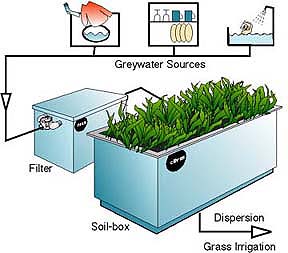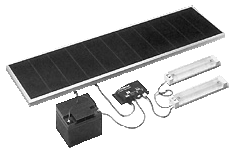Long Term Approaches
Greywater:
- Greywater is water which drains from dishwashers, clothes washers, bathtubs and kitchen sinks. Blackwater is water which drains down your toilet. Because greywater contains much less nitrogen than blackwater it is unnecessary for it to undergo the same level of treatment. A greywater system operates by collecting the wastewater to make it available for other uses such as watering of the lawn and garden or in the toilet. Greywater systems can be designed for a single house or for an entire neighbourhood using a central greywater collection centre. Retrofitting of an existing house can be done by re-routing the wastewater form the sinks, bathtubs, dishwasher, and washing machine. Visit www.greywater.com for the complete facts about greywater.
-
Solar Voltaics:
Solar voltaics harness the sun's energy and can feed energy directly to an appliance or store it in battery cells for use at a later date. These systems have the potential to be used in conjunction with traditional power sources. At times of low sunlight the system feeds off of stored solar power in the batteries and, as a last resort, would switch to the grid power if necessary. The major advantage of solar voltaics is that once the infrastructure is in place there are no operating costs! In addition, the panels perform better in cooler climates where there is much sunshine (such as Calgary)! As markets for solar voltaics increases and prices are reduced there is much potential to supply a household with a much of their power.
Community Year-round Greenhouse:
A community greenhouse allows for local food production and for the germination of seeds for the summer growing season. Locally produced compost can be used to enrich the soil with greywater being used as the irrigation source. Community gardening expertise can be shared at workshops to assist those interested in learning to garden. There are many greenhouse designs that can be built using the skills of local people and low-cost materials.
NextPage

